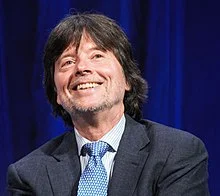
Ken Burns
Ken Burns, born on July 29, 1953, in Brooklyn, New York, is a distinguished American documentary filmmaker renowned for his unique style that utilizes archival footage, photographs, and interviews. His work often delves into American history and culture, marked by a narrative voice that brings historical events to life. Burns rose to prominence with his groundbreaking series "The Civil War" (1990), which captivated audiences and won numerous awards. Educated at Hampshire College, Burns developed a passion for storytelling and history. He founded his own production company, Florentine Films, and directed numerous acclaimed documentaries, including "Baseball" (1994), "Jazz" (2001), and "The Vietnam War" (2017). His work is characterized by its emotional depth, exhaustive research, and the use of panning and zooming on photographs, known as the "Ken Burns effect." Burns' contributions to film and history have earned him several honors, including Emmy Awards and nominations for Academy Awards.
Exploring Creativity and Collaboration: SmartLess Podcast with Ken Burns
The “SmartLess” podcast episode featuring renowned filmmaker Ken Burns is a captivating blend of humor, introspection, and insightful discussion on creativity, history, and documentary filmmaking. Hosted by Jason Bateman, Will Arnett, and Sean Hayes, the conversation delves into Burns’ extensive career, his approach to storytelling, and the impact of his work.
The Genius of Ken Burns
Ken Burns, celebrated for his documentaries like “The Civil War” and “Baseball,” shares his journey as a filmmaker. He emphasizes his commitment to bringing history to life, driven by a deep fascination with the past and its resonances in the present. Burns’ passion for his craft is evident in his discussion of various projects, including his documentary on Muhammad Ali, revealing his meticulous approach to research and storytelling.
Collaboration and Creativity
The hosts engage Burns in a lively discussion about the creative process. They explore the interplay between history and narrative, the challenges of documentary filmmaking, and the importance of music in Burns’ work. The conversation also touches on Burns’ personal inspirations and his ability to weave complex historical narratives into compelling stories.
Highlights and Insights
Burns’ Filmmaking Philosophy: Burns describes his approach to documentary filmmaking as an attempt to “wake the dead,” a pursuit influenced by personal experiences and a desire to connect the past with the present.
Impact of Music: Burns emphasizes the integral role of music in his documentaries, discussing how musical choices enhance the emotional depth and narrative flow of his films.
Exploring American History: The episode delves into Burns’ exploration of American history, highlighting his commitment to unearthing diverse stories and perspectives.
Creativity in Constraints: Burns discusses the challenges and rewards of adhering to historical accuracy in storytelling, showcasing his ability to craft engaging narratives within the confines of factual events.
Ken Burns on Storytelling and Historical Authenticity
In the second part of the “SmartLess” podcast episode featuring Ken Burns, the renowned documentary filmmaker delves into the nuances of storytelling, the meticulous crafting of historical narratives, and his unique approach to documentary filmmaking. Burns, known for his works like “The Civil War” and “Baseball,” discusses the importance of balancing historical accuracy with compelling storytelling.
The Art of Documentary Narration
The episode delves into Burns’ choice of narrators for his documentaries. Burns explains his preference for narrators who deeply understand the story, rather than just possessing a commanding voice. This approach, as exemplified by his collaboration with historian David McCullough, underscores Burns’ dedication to authenticity and emotional resonance in his films.
The Power of Music in Documentaries
Burns emphasizes the significant role of music in his documentaries. He illustrates how musical choices are not mere afterthoughts but integral components that drive the narrative and emotional depth of his films. This approach highlights his belief in the transformative power of music to enhance storytelling.
Exploring American Identity and Race
The conversation touches on Burns’ exploration of American identity and the recurring theme of race in his documentaries. He reflects on the complex narratives of American history and the importance of presenting diverse perspectives and stories. This commitment to inclusivity and depth is a hallmark of Burns’ filmmaking ethos.
Ken Burns’ Creative Process and Work Ethic
Burns shares insights into his creative process and work ethic. He discusses the challenges and rewards of documentary filmmaking, emphasizing his commitment to crafting stories that resonate deeply with audiences. His approach reveals a blend of passion, dedication, and a deep respect for the subjects of his documentaries.
Delving Deeper into Ken Burns’ Artistry and Views
In the final third of the “SmartLess” podcast episode featuring Ken Burns, the conversation takes a more profound turn, exploring Burns’ views on American history, his artistic choices in filmmaking, and the impact of his work.
Burns on American History and Its Complexities
Burns shares his insights on American history, emphasizing its complexities and the recurring theme of race. He discusses his documentary projects that explore various aspects of American identity, highlighting his dedication to presenting a comprehensive view of historical events and figures.
The Filmmaking Process: Music, Narration, and Editing
Ken Burns delves into the technical aspects of his filmmaking process. He discusses the importance of music in his documentaries, explaining how it drives the narrative and adds emotional depth. Burns also talks about his approach to narration, preferring narrators who deeply understand the story. His editing process, which involves meticulously choosing visuals and sound, is revealed as a crucial aspect of his storytelling.
Ken Burns on the Future and Other Filmmakers
When asked about his views on the future and other filmmakers, Burns expresses optimism and respect for his peers. He acknowledges the contributions of other documentary filmmakers, highlighting the diversity of styles and approaches in the field.
Conclusion
The final part of the “SmartLess” podcast with Ken Burns provides a comprehensive look into his thoughts on American history, his filmmaking techniques, and his perspective on the future. Burns’ passion for storytelling and his commitment to historical accuracy shine through, offering a valuable lesson in the art of documentary filmmaking.
